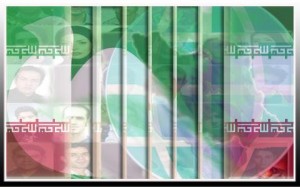Monday
Jan182010
Iran Analysis: How "Mohareb" Death Sentences May Hurt Regime
 Monday, January 18, 2010 at 8:04
Monday, January 18, 2010 at 8:04  Edward Yeranian of Voice of America reports:
Edward Yeranian of Voice of America reports:Iran will put 16 opposition demonstrators on trial, Monday, and several are to be charged with "offending God and his prophet." Sixty journalists and intellectuals are expressing outrage over use of the charge of being "mohareb", which carries the death penalty.
The Iranian judiciary will put 16 opposition protesters on trial, Monday, in connection with demonstrations last month on the holy day of Ashoura. Press reports and recent statements by Iranian prosecutors indicate several will be charged with the offense of "mohareb" or "making war against God and his prophet." Conviction on such a charge carries the death penalty.
The Latest from Iran (18 January): Firewall
In an open letter to the Iranian judiciary, a group of 60 Iranian journalists and intellectuals, most of whom live abroad, are demanding a stop to using the religiously-based charge of "mohareb" against opposition protesters. They say in their letter, that "if protesting is making war against God, then we are all warriors."
Some pro-government supporters are also unhappy about the use of the charge against opposition protesters. In a recent interview with Iranian state TV, Javad Etaat, argues the government is contravening the principles of Islam by using an iron fist against protesters. He points out the first Imam of Shi'ite muslims, Imam Ali, said 'keep people that criticize you close to yourselves, because even if their words are bitter, you will benefit from them in the end."
Former Iranian president Abolhassan Bani Sadr, who now lives in exile in Paris, argues the use of the term "mohareb" by the Iranian government is excessive. He says the regime is not respecting its own laws, because the term "enemy of God" means someone who takes up arms against a just regime, and people did not take up arms against the regime, they were merely demonstrating to protest against dictatorship, a right which the law of the Islamic Republic gives them. Secondly, he argues, in the case of an unjust regime, the Koran says a muslim has not only the right, but the obligation to revolt against it. Thirdly, he adds, it was the government that fired on the people during Ashoura, when they were exercising their legitimate right to demonstrate.
Scott Lucas of the University of Birmingham in Britain, who is behind the popular Iran blog "Enduring America," says government tactics such as charging protesters with being "enemies of God" are starting to cause a rift within the government itself. "If you look at what Dr. Etaat said during that extraordinary (Iranian TV) interview this week, this is a very telling point, which he said: when you use the term "velvet revolution" and the terms "enemy of God," what you are pointing to is a revolution against an unjust system. You are highlighting how unjust the system is by using the terms. So, "mohareb," rather than unifying people behind the Islamic Republic just risks causing more splits and rifts, and rifts within the regime. There is some really serious opposition within the regime, which is saying "look, back off, stop doing this," and one reason is because they are using this term "mohareb," he says.
Lucas says the judiciary appears to be downplaying the latest trials, unlike the "show trials of opposition activists during the summer."
